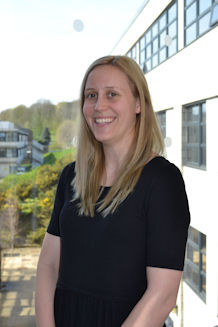Charlotte Kitchen
Research Fellow
Profile
Biography
Dr Charlotte Kitchen is a Research Fellow for the Centre of Excellence in Behavioural Activation (CEBA), a research hub created and supported by Tees, Esk and Wear Valleys NHS Foundation Trust in collaboration with the University of York. The CEBA hub brings together staff who deliver or support research studies on Behavioural Activation (BA), a brief psychological treatment recommended for depression.
Charlotte's background is in Psychology and her PhD focused upon evaluating a BA intervention for young people with depression in Child and Adolescent Mental Health Services. During her PhD she was awarded the British Psychological Society Postgraduate Fellowship Award which enabled her to undertake a three month placement in the Houses of Parliament, where she was based in the Parliamentary Office of Science and Technology.
Charlotte joined the Mental Health and Addictions Research Group in 2017 as a Trial Support Officer on the CASPER (collaborative care for older adults with major depressive disorder) and CHEMIST (community pharmacies mood intervention) research projects. Following this she worked as a Research Fellow with the Diabetes and Mental Illness Improving Services and Outcomes (DIAMONDS) team. She was most recently an Economic and Social Research Council (ESRC) White Rose Post-Doctoral Fellow based in the Public Health and Society Research Group in the University of York's Department of Health Sciences, working with Professor Kate Pickett and Dr Stephanie Prady. Her Fellowship sought to understand the variation in adolescent's experience of psychotherapy using social inequalities as an explanatory framework to contribute to the on-going debate about how best to deliver psychotherapy to greater numbers of young people without excluding those who may need it the most.
Qualifications
- BSc (Hons) Psychology, Newcastle University, 2009
- PGCert Health Research Methods, Durham University, 2013
- PhD Health Studies, Durham University, 2018
Research
Overview
Charlotte’s research interests focus upon interventions to improve adolescent mental health, specifically Behavioural Activation, and equitable access to and engagement with psychological therapies more broadly. Her methodological interests include qualitative study of lived experiences and the application of mixed methods within a trials context.
Projects
- ESRC White Rose Fellowship: Understanding young people's engagement with psychological therapies through a social inequalities lens
Research group(s)
Contact details
External activities
Media coverage
FUSE Open Science Blog: http://fuseopenscienceblog.blogspot.co.uk/2017/01/an-education-in-how-research-influences.html

